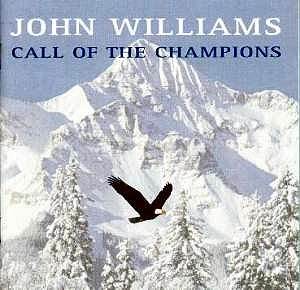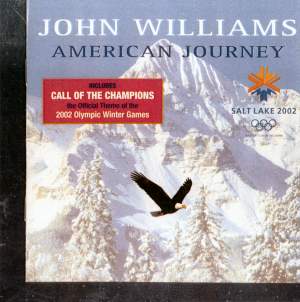CURIO CORNER
John WILLIAMS
Call of the Champions; American Journey etc.
Commissioned and concert works conducted by the composer, featuring primarily the Utah Symphony and The Recording Arts Orchestra of Los Angeles.
SONY 364 [60:50]


Does anyone write music that better speaks to America's self-image than John Williams? I pose the question thus to preclude political arguments from those inclined to challenge our admittedly self-congratulatory (or perhaps just self-obsessed) demeanor. At issue here is the manner in which Williams has, over the years, composed music that resonates so deeply with the American ethos. It helps, no doubt, when you're Steven Spielberg's house composer -- no filmmaker since John Ford has done more to turn the American milieu into an iconic experience. But there is more here than just music to wave the flag by: Williams' music can, and often does, invoke a nearly spiritual sense of this country's experience and, like a good movie score, he might even be said to influence how we Americans feel about ourselves.
No wonder, then, that he's been repeatedly commissioned to compose music for Olympics held in this country. Beginning in 1984 in Los Angeles, and continuing in Atlanta in '96 with a stopover in Calgary in '88 (well, Canada's almost American!) Williams has set the tone, the drumbeat and yes, the heartbeat, for Olympians. He does it again with 'Call of the Champions' for the 2002 Winter Games in Utah (which will have been just finished by the time this is read). This time, an added touch: With a nod to the Salt Lake City setting, Williams utilizes the magnificent Mormon Tabernacle Choir as well as the Utah Symphony (the latter being no stranger to film music fans for its recreation of several classic scores over the past few years.) Admittedly, the choir's role here is largely decorative, but its considerable power is not lost, most particularly in the work's opening, a lusty enunciation of "Citius! Altius! Fortius" (swifter, higher, stronger), encapsulating that aspect of the Olympics. The choir also helps lend an anthem-like sense to 'Call of the Champions,' which Williams propels muscularly through its 5-minute course with the help of an energizing, 12-note motif. Especially effective is the use of wordless female voices with orchestral bell sounds.
This is followed by a 6-movement, uninterrupted suite from "American Journey," which Williams wrote to accompany a multi-media presentation by Spielberg and other artists to mark the millennium. It is here, in what Williams has called "an attempt to portray the 20th century thematically," that the composer truly shines. With cue titles such as 'Immigration and Building' and 'Flight and Technology,' the music is sufficiently celebratory and often inspirational (and with more than a passing nod to Copland in the cue 'Popular Entertainment'). Yet this is clearly not an America seen only through rose-colored glasses. Williams reins in the heroic mode at the proper moments, such as the beginning of 'The Country at War' and portions of 'Civil Rights and the Women's Movement,' the latter stressing inspiration over celebration. As quoted in the liner notes, Williams puts it this way: "We wanted to look at the good things and bad things and frame them in such a way as to take heed, and take heart at the same time." Fittingly, "American Journey's" working title was "Unfinished Journey." Perhaps we Americans aren't so smug after all.
The second half of this CD consists largely of smaller commissioned works Williams has written over the past 15 years or so, many during his tenure with the Boston Pops. All, I assume, have been recorded previously, though that may not be the case, and the liner notes are moot on this matter. I especially liked the softly lyrical 'Song for World Peace,' and 'Celebrate Discovery,' which opens with an ennobling call from the French horns (and which sounds rather like I imagine the march from '1941' might have, if that film hadn't been a comedy.) 'Summon the Heroes,' perhaps Williams' best known Olympic work, is included as a "bonus" track - whatever that means - and the 'Mission Theme,' well known to U.S. viewers of NBC News (NBC is a television sponsor of the Olympics) is also here for good measure. 'Sound the Bells' was written in 1993 to celebrate a wedding within the Japanese royal family. Some critics have questioned Williams' use of a conventional, Western orchestral style for the work, rather than attempting a more appropriate Japanese mode. But as the liner notes point out, Williams' intent was to convey a distinctly American greeting (after all, why else would you hire him?)
Also offered are 'Jubilee 350,' 'Hymn to New England' (in a recording Williams made with the Utah Symphony the same day as 'Call of the Champions') and 'For New York,' the last a fun piece I'd never heard before. It was written originally as a 70th birthday tribute to Leonard Bernstein and consists of variations on his 'On the Town' and 'West Side Story.' Besides honoring Bernstein, its presence here also has something of a post 9-11 purpose, serving as (to quote Williams again) "a warm tip of the hat to New York City itself."
Ahh, that John Williams -- always making us Americans feel good.
John Huether

Ian Lace adds:-
John has said it all. There is much to admire here in this celebratory music whether you are American or not. Williamsís Olympics music has become a tradition and his new Winter 2002 hymn, Call of the Champions, with its overlapping fanfares and evocative figures of thrilling snowy competition, lifts both the heart and the spirit. The other pieces appeal straight to the emotions too and whilst we over here on this side of the Atlantic might not find them quite so involving we can appreciate certainly appreciate their quality.
Ian Lace

Return to Index